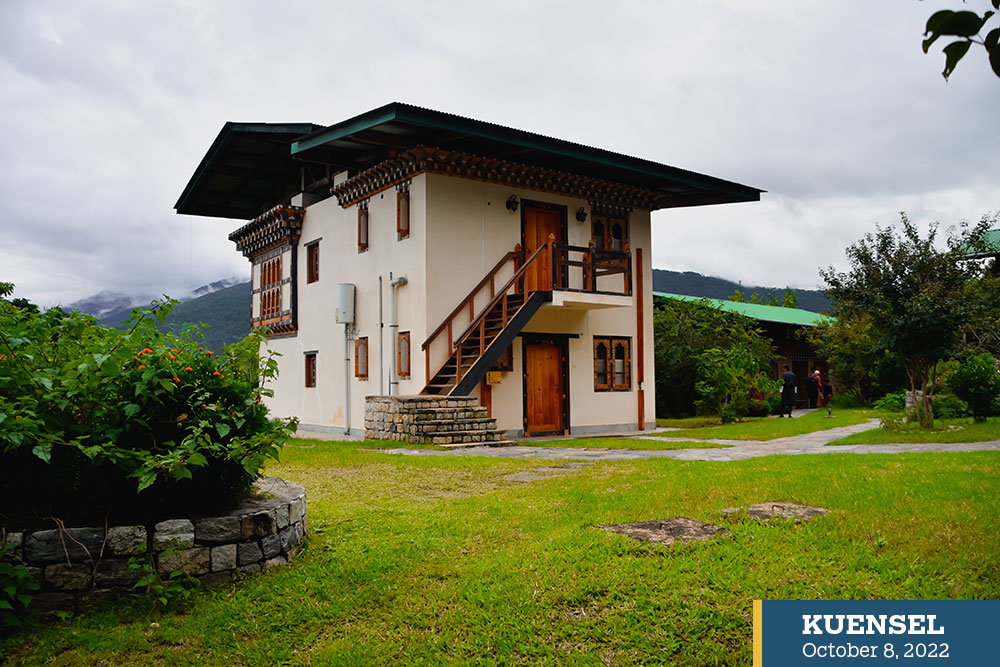Jigme Wangchuk
The best view of the famous Punakha Dzong can be had from nowhere else but here, from high up in the pine forest, opposite the lush Mindagang village by the side of the Phochhu, far away. The songs of the cicadas make it all the more idyllic, almost heaven. The road up to this spot, winding on and on through a rough road that feels like a journey towards eternity stretches on until the forest door opens up to halcyon view of the heaven itself. All the rough rides and troubled thinking die down right here.
At the head of Logodama village in Punakha, we have arrived at the Dhumra, a farm resort that is trying hard to give a true Bhutan experience to the visitors—locals and international.
The concept was born from the need to provide a place for sustainable tourism in the true sense of the term.
Once you are in the Dhumra, a total wasteland not so long ago, you are in the vastness of a 7.1-acre space, all ornamented with a rich habitat of fruits and herbs and more. The entry into the Dhumra itself is steeped in significance that sums up the Bhutanese experience—a flag of white, yellow, red, green and blue, to welcome you.
Welcome the spirits
Whoever comes to the Dhumra gets to know the true idea of Bhutan’s tourism. It is the experience, not necessarily luxury treatment—tourists who come to Bhutan come for the experience, not for extravagance. Bhutan’s congealed idea, therefore, is to give Bhutan raw to international visitors.
If Bhutan is in fruit trees and herbs, it is Dhumra. If organic is the new face of Bhutan, Dhumra gives the best, easily. There are countless varieties of turmeric, ginger, thyme and other species of herbs and fruits that the resort picks for meals, from its own gardens.
The idea, born out of the head of the owner, is sustainable tourism. Employment and benefits go to the locals.
Raw and pure milk is offered to tourists, for example. Dhumra does not keep cows. For the milk supply, Dhumra employs a woman just a few metres away who keeps a bunch of milking cows. In Dhumra, all employees are women.
Why, one might ask…
The employees are all from the locality. It’s an income opportunity for them, single mothers and those from a broken family.
Sustainable animals and plants
Dogs out; cats in. Dogs litter; cats keep mice away. The idea is to make the guest feel the “peace”.
There are 12 cats in Dhumra but not a single loitering dog.
Punakha is blessed with good weather and climate; done right, farming can be most effective and rewarding in this dzongkhag.
Banana grows here but the people stopped growing the fruit just because of a disease. Likewise, avocado, lemon, guava, foxtail millet, wild herbs and lemongrass, among others, grow aplenty here.
Dessert of love
Here in Dhumra, nothing is imported save salt, sugar and oil. Rest are all organic—a true picture of Bhutan as the country opens up with new selling points. Here, the health and safety of employees and visitors are paramount. In other words, this can be called mindful tourism.
Put simply, tourism can go anywhere if we can sell the product—the product can be both raw and refined. What is important is packaging and how we offer it to visitors and guests.
The true dessert of the idea, congealed in the head and heart, is to bring young people to the centre of the idea of sustainable business. At a time when Bhutan is grappling with the rising issue of unemployment, Dhumra could be an idea to settle and sink it all.
The dream
The Dhumra is just a dream, a dream to start small and walk up the hill with pride. The dream is to employ or give space to internships for Bhutanese and students from abroad to learn about sustainable tourism and agriculture.
But there is a missing link. There is no drive for an engagement like this. When Dhumra gives space for tourists and visiting locals and hopes to impart the vital lesson of sustainability, it often is just Dhumra doing it all.
The Dhumra
The owner of the Dhumra thinks that more can certainly be done because the enterprise is about education, after all.
T. Sangay Wangchuk, the owner of the Dhumra, sees only many Dhumras in Bhutan.
“High-value tourism in Bhutan is all about uniqueness. Star hotels are important but true Bhutan and Bhutanese experience is what we can give. That, perhaps, is what the new tourism policy is all about.”


